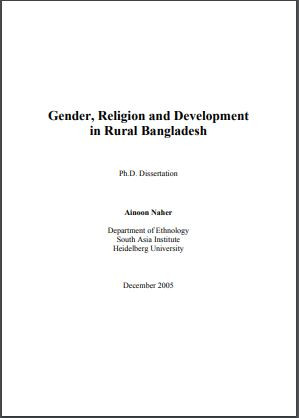
This thesis examines the relationships between gender, religion and development in rural Bangladesh in the context of a series of attacks on NGOs by ‘fundamentalist’ forces in the country in the early part of the 1990s. Specifically, the focus is on the emergence of rural women as a center of contention as events unfolded. My examination of the discourses and various political, economic and social factors that surrounded or underlay these events shows that the poor rural women in Bangladesh were being pulled in different directions as a result of multiple forces operating in the context of structures of inequality that existed at global, national, community and domestic levels. Based on fieldwork carried in the village of Jiri in Chittagong, Bangladesh, the thesis argues that while it is possible to see the attacks against NGOs as ‘resistance’ against ‘Western’ or ‘elite’ domination/exploitation, a closer look of events reveals that forms of gender inequality operating at domestic and community levels are largely behind the targeting of women beneficiaries of NGOs by the ‘fundamentalists’. The thesis also explores the nature and extent of rural women’s resistance to these events and concludes that instead of representing the ‘poor rural women’ of Bangladesh only as victims, their active and creative roles also must be stressed in our analysis.
Naher, A, ‘Gender, religion and development in rural Bangladesh’ (Unpublished doctoral thesis: Department of Ethnology, South Asia Institute, Heidelberg University, 2006).
I agree to the terms outlined below:
You agree to upload and assign Mosqpedia Database the rights to use the content worldwide and in perpetuity across all current and future media platforms. Mosqpedia Database may edit, copy, adapt and translate your contribution.
The content will be distributed under the Creative Commons Attribution-Deed – Attribution-NonCommercial-NoDerivatives 4.0 International – Creative Commons
All data will be stored in line with data protection regulations.